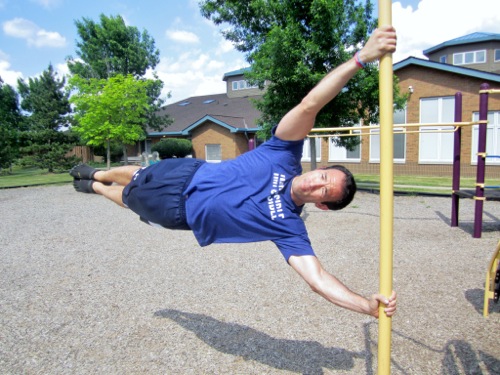Physical fitness is a terrible goal.
I might ruffle some feathers with this post but it really is. Sure, it sounds like a great goal, but it’s a terribly misleading.
Lets break it down.
Why Physical Fitness is a TERRIBLE Goal
Table of Contents
There’s a whole bunch of reasons.
It’s Not Defined
Physical fitness is a state of being, but it’s not a goal. It sounds nice if you could just magically float around in a state of fitness on a cloud while eating “healthy” foods and being fit, but it’s not a goal.
Physical fitness is not a definite goal.
It’s Not Measurable
Because it’s not defined, it’s not measurable. Physical fitness has no benchmark. You can never know if you’re actually there. There’s no metric.
Look at the following list. One of these things is not like the other:
- Deadlift 300lbs.
- Do 20 pull-ups.
- Run a mile in less than 6 minutes.
- Run 26.2 miles consecutively.
- Be physically fit.
All of these (except one) are incredibly specific. You can either do them or you can’t.
- Deadlift 300lbs: You either can do it or you can’t.
- Do 20 pull-ups: You can either do it or you can’t.
- Run a mile in less than 6 minutes: You can either do it or you can’t.
- Run 26.2 miles consecutively. You can either do it or you can’t.
- Be physically fit……….
The problem with being “physically fit” is it has no definition – it’s just is (whatever that means). It changes for different people.
Some people think it’s a certain weight, some think it’s a certain BMI or body composition. Others will think it’s the ability to do a certain distance race. For some people it’s to finally not being exhausted walking up the stairs, but until you define it for yourself, it provides no actual metric
But being “physically fit”, provides no actual metric for knowing how far you’ve come or if you ever get there. There’s no benchmark, so while it’s a nice ideal, it’s not really attainable.
You Learn Nothing
Most people try to be physically fit, but because they’re not measureable, and not attainable, they never properly orient their actions around their goal (because one doesn’t really exist). Instead of making concerted efforts in a choreographed manner, they do a little here, and a littler there, but they never actually improve or learn anything.
They try a few exercises for a few weeks, but they essentially stay the same person with the same knowledge when they started out.
Why Challenges
Because challenges are measurable you’ll either complete a challenge or fail it. There’s no middle ground. You can either run the distance or you can’t. You can either lift the weight or you can’t. You can either succeed or fail. If you succeed, you set a new challenge and keep going. If you fail, you can recalibrate and make a new attempt at it.
If that sounds daunting, it’s much better than staying in no-man’s-land and never knowing. Failing sucks, but it isn’t fatal. At the very least it gives you feedback in one way/shape/form.
With challenges, you can either do it or you can’t. There’s no “maybe.” There’s no more questions of whether of not it’s possible. It either is or isn’t.
They’re Learnable.
The best part about challenges is you can learn from them. You can do anything for 30 days. You should be able to do anything for 8 weeks.
- If you want to run a marathon, you don’t have to dedicate your life to running marathons, you just have to spend 3 months training.
- If you have want to run a triathlon, you don’t need to become the top triathlete in the world. You just have to run your first one ever.
- You dont’ have to set a world record in deadlifting, you just have to set your own goal and then hit it.
Not only is this effective, but it’s a lot more fun.
It’s really hard to learn something while trying to be physically fit because your next course of action is blurry.
You might try a few different things, eat a few different foods and head to the gym a couple times a week, but you most likely won’t create focused routines, form habits, or make lasting changes. You can spend tons of time learning to get fit while never actually learning anything.
Because the goal is vague, your immediate next steps aren’t clear. Challenges change that.
- If you want to run a marathon, you practice until you understand running and are capable of running a marathon.
- If you want to lose 20 pounds, you get a framework and learn what you need to do to burn fat.
- If you want to add weight to your deadlift, you start learning how to deadlift until you get good enough to hit your weight goals.
You might be completely ignorant when you start, but by the time you cross that finish line/lift that weight/lose that weight, you’ll know infinitely more about yourself and the subject area than if you started from scratch.
The Real Problem With “Fitness” as a Goal
It’s Lazy. No, it’s not necessarily lazy with your workouts – it’s lazy goal setting. “Being fit” is a lazy goal. It’s easy to say and most everyone will accept it, but no one will call you out on it.
No one will hold you accountable to whether or not you do it, because there’s nothing to actually hold you accountable to.
- If you want a six pack, say it.
- If you want to be able to run a 3 hour marathon, say it.
- If you want to deadlift 400 pounds, say it.
- If you want to do a planche pushup, say it.
- If you want to do a firefly pose in yoga, say it.
Then go do it.
But, don’t cop out and pick a vague goal like “fitness” and wonder why you don’t achieve it. Be concrete.
The less specific you are with a goal, the less likely you are to achieve it. If you don’t say it or at the very least, write it down, you won’t do it. Have the courage to say what you really want. This goes for fitness. This goes for life.
The Real Power Of Challenges
The real power of challenges is they give you focus. They give you something to orient your behavior around. Fitness is a great concept, but its an unfocused goal and incredibly difficult to measure your progress. Set a challenge, then go do it and learn a ton of things along the way
If you want to set better goals, set more challenges.
Set impossible challenges, and then catch up with them! – Richard Branson
How do we do that? Simple. Follow this formula:
–> Pick a challenge. Pick a date.
Accomplish [specific challenge here] by [insert specific date here].
A few concrete examples of this include:
- LIft 100 pounds more by 3/3/13.
- Run a Marathon By July 1st.
- Get A Six Pack in 8 Weeks.
- Run A Triathlon in 3 Months.
Be specific about the thing you want to accomplish and the time frame you want to accomplish it in.
Don’t be lazy and set terrible goals. Be specific and set impossible challenges. Then catch up to them.
We’ll take an even deeper look at this in an upcoming post. Stay tuned.
—
Big props to Mike for killing it in his Impossible Shirt




This is excellent. just absolutely brilliant advice, and something that is very easily overlooked when goal setting and starting something new.
I’ll definitely be reading this again when its not midnight and i can think a bit straighter.
I have to disagree on this one. As someone who has experienced long-term sports injuries in the past, my primary goal in keeping fit is to keep fit, enjoy sports, and stay pan-free. Do I have a target weight I stay below? Yes. Do I measure my progress every week on the weights? Yes. Do I notice my progress in yoga class when I reach my toes? Yes. But ultimately do I care about that or set goals for the next level? No, I don’t care. I have goals for my income Andy business. I have goals for my vacation destinations. I have goals for my community contribution. I don’t need goals in every area of my life.
To me, fitness is a means to an end. I keep my body in excellent working order so I can achieve those other goals. Physical fitness is the foundation of emotional fitness, of feeling capable . Sports are a source of tremendous happiness and joy in my life.
I don’t need a measurable goal in order to feel great. In fact, if you really think about it, feeling great IS the goal in life and it isn’t measurable. I admire people with sports goals, I really do; but I don’t enjoy my body any less because I’m not one of them.
Agree but i think its also important to understand that being fit, It’s not a goal it’s a vision – most people confuse vision and goals but they’re both important. Goals without vision are limp, rolled up in the vision is the why, it’s the fuel for reaching the goal.
Yes, I agree, good point. But not everyone wants to achieve that kind of goal. I think the advice could be just as well applied to let’s say, working out for 45mins every morning, five mornings a week. It is not a marathon, but it is still a goal. Or even, write a blog post or article every day. It is not a major event but it is a challenge and it is a goal and both are measurable.
Brendon’s notion of vision is a good one. Healthy eating and fitness are both a way of life – a vision of how we want to live. But being constant here is just as difficult as and as challenging as getting ready for a triathlon.
Or not?
Joel,
Fitness can be defined and is most certainly measurable. I know of a certain program that does both, I understand the concept of your article but I think you should look into your characteristics that you use to denounce it’s credibility.
Let’s use CrossFit’s definition of fitness: increased work capacity across broad time and modal domains.
How is it measurable? Let’s look a the definition of work, or better yet average power (cuz that’s more sciencey) force x distance over time equals average power. You can measure it in a human the same way you measure horsepower in a car.
So take the ability to measure the work that you are doing and see it if you improve over time and there you have it.
Measure yourself day one, do so constantly varied high intensity functional movement for a month and repeat the first work you did. If you got faster or did more reps are you not fitter by said definition?
But see, crossfit defined their meaning of fitness, which is exactly what the whole post is about: defining your goal.